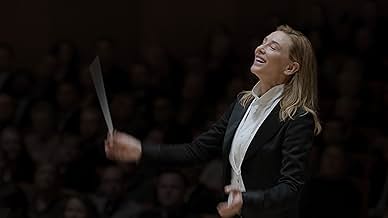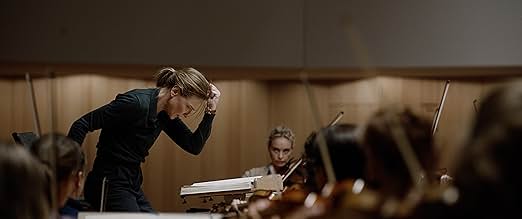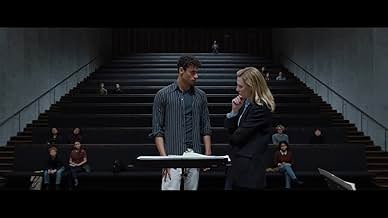Ambientada en el mundo internacional de la música clásica, se centra en Lydia Tár, considerada una de las mejores compositoras/directoras vivas y la primera directora titular de una importan... Leer todoAmbientada en el mundo internacional de la música clásica, se centra en Lydia Tár, considerada una de las mejores compositoras/directoras vivas y la primera directora titular de una importante orquesta alemana.Ambientada en el mundo internacional de la música clásica, se centra en Lydia Tár, considerada una de las mejores compositoras/directoras vivas y la primera directora titular de una importante orquesta alemana.
- Nominado para 6 premios Óscar
- 79 premios y 272 nominaciones en total
Zethphan D. Smith-Gneist
- Max
- (as Zethphan Smith-Gneist)
Reseñas destacadas
Initially I was put off by Tár-it's cryptic, drab, and sluggish. Until I realized what the filmmakers were actually accomplishing. No spoilers in this review, but to enjoy the film you have to know certain things:
1. Yes, Cate Blanchett is fantastic and rightfully deserves the accolades.
2. The film is the slowest of slow burns.
3. The film does not hold your hand.
4. The film's narrative cuts out key elements of scenes that other filmmakers would have highlighted. This was the sticking point for me-it didn't dawn on me until halfway through the film what was happening. If you know this going in, I believe you'll have a better experience with the film. The film purposefully *doesn't* show you the "important" elements of scenes or relationships between characters. You have to figure that out yourself, just like putting together the puzzle of who Lydia Tár actually is. Here's a quick non-related example:
Bill stared at the smoke in the frying pan.
Bill rubbed his nose five times and took a call from Ernest while sipping coffee at Station 271.
If those two sentences above were in a book, it would be leaving out major plot points that other authors would have filled in. First, there was a fire in Bill's kitchen. He called the fire department. He had to evacuate, so the fire may have been bad. And who is Ernest, if we have not been introduced to that character before? Why is bill rubbing his nose so much? Is it a tick or OCD or nervous habit?
That's what Tár is like. It presents to you all the items "between the lines" and lets you solve for X for yourself. Once I understood that that was the dominant cinematic approach in this film, it became immensely more enjoyable...and challenging. Very much worth your time if you put in the effort.
1. Yes, Cate Blanchett is fantastic and rightfully deserves the accolades.
2. The film is the slowest of slow burns.
3. The film does not hold your hand.
4. The film's narrative cuts out key elements of scenes that other filmmakers would have highlighted. This was the sticking point for me-it didn't dawn on me until halfway through the film what was happening. If you know this going in, I believe you'll have a better experience with the film. The film purposefully *doesn't* show you the "important" elements of scenes or relationships between characters. You have to figure that out yourself, just like putting together the puzzle of who Lydia Tár actually is. Here's a quick non-related example:
Bill stared at the smoke in the frying pan.
Bill rubbed his nose five times and took a call from Ernest while sipping coffee at Station 271.
If those two sentences above were in a book, it would be leaving out major plot points that other authors would have filled in. First, there was a fire in Bill's kitchen. He called the fire department. He had to evacuate, so the fire may have been bad. And who is Ernest, if we have not been introduced to that character before? Why is bill rubbing his nose so much? Is it a tick or OCD or nervous habit?
That's what Tár is like. It presents to you all the items "between the lines" and lets you solve for X for yourself. Once I understood that that was the dominant cinematic approach in this film, it became immensely more enjoyable...and challenging. Very much worth your time if you put in the effort.
'Tár', one of the most talked about films of 2022 and a serious contender for the Academy Awards, with six nominations, is written and directed by Todd Field - a filmmaker who does not seem at all rushed or prone to accumulate impressive numbers in his filmography. In fact 'Tár' is only his third feature film and it is made 16 years after the previous one. The fictional biography of a great musician - symphony orchestra conductor - 'Tár' seems and was written for Cate Blanchett and suits her to such an extent that after watching it it is hard to imagine another actress in this role. It's a complex and loooooong film (yes, that's its main problem!) which in almost three hours of projection manages to bring to the screen a multitude of problems related to the world of great musicians and the way they combine their careers with their personal lives, about the place of women in a competitive world where private lives are scrutinized and mistakes are not forgiven, about the role of media and social networks in celebrity careers, and about political correctness and its verdicts in the public square of the Internet age. Above all, however, it is a film about the power games in the fascinating and complicated world of great art.
The titular heroine of the film, Lydia Tár, seems to be a model of success in every way. A student of Leonard Berstein, she is one of the world's great conductors, winner of all possible awards, principal conductor of the Berlin Orchestra and professor at Julliard. She has, of course, had to work hard and fight fiercely for this position, as a woman and as a lesbian (her partner is the concertmaster of the orchestra), but the beginning of the film catches her at her peak and the past is not mentioned until it begins to insinuate in the present. Relationships with his daughter, an elementary school student, indicate traumas in the distant past. A conductor with whom she had a more recent relationship pursues her obsessively, and Lydia retaliates by blocking her artistic career. Her position of power seems to allow all but also requires her to make decisions that do not always seem completely professionally motivated. Sometimes it seems that she uses her power to fuel personal passions, but everything happens in an ambiguous zone. Her faithful assistant is skipped by her from a promotion, an instrumentalist in the orchestra is loses to a younger candidate the opportunity to perform a concert, in one of the lessons at Julliard she adopts a very politically incorrect attitude in a dialogue with a student. These are small and debatable incidents, but in all cases the decisions are hers alone. Perfectionism can be a great quality of a conductor who must have absolute control over every sound, tempo and nuance in a concert or recording. But life is more complicated, even than a Mahler symphony.
Director Todd Field seems to have drawn himself inspiration from his character, making some creative decisions that influence how the film looks. However, not all of them are for the benefit of the movie, some seemed questionable to me. The film begins with the credits that usually roll at the end, when the lights come up and the audience leaves the theater. It's a nice sign of respect for the technical team, but should this take precedence over the spectators in the cinema halls? The length of the film far exceeds that of Mahler's symphonies. Yes, this is the fashion in Hollywood, but here I feel that more brevity would have served the film. The first half hour seems like a docu-drama (an excellent one, by the way) about the life of a great musician, and another hour or so passes - spent in the stratosphere of the world of great musicians, in concert halls and luxurious apartments where the pianos don't even fill the spaces, until the drama really kicks off. Indeed, when events rush headlong, we are dealing with a genuine drama, which calls into question the entire world of intellectual and material luxury in which we had been immersed until then. The filming style also changes, from documentary style and long one-shots (see the Julliard scene) in the first part, to nervous editing with action film techniques. Neither the world of music with its intrigues and power games, nor that of the media and social media that can destroy lives and careers come out well in the story conceived by screenwriter Todd Field. The generosity in duration allows for the construction of several memorable roles - mostly feminine. I don't know if Cate Blanchett will get the Best Actress Academy Award this year again (it would be her third time), but her role seemed to me one of the best of a career in which I don't remember any failures or miscasts. I'd rather bet on the award for original script. We will see. In any case, 'Tár' is one of the most interesting films of the year, but also one of those that demands the attention and patience of the viewers. Using, again, the metaphor of Mahler's music, just as his symphonies are not liked by every classical music-loving audience, this film is not intended for every moviegoer. But those who like it, will like it a lot.
The titular heroine of the film, Lydia Tár, seems to be a model of success in every way. A student of Leonard Berstein, she is one of the world's great conductors, winner of all possible awards, principal conductor of the Berlin Orchestra and professor at Julliard. She has, of course, had to work hard and fight fiercely for this position, as a woman and as a lesbian (her partner is the concertmaster of the orchestra), but the beginning of the film catches her at her peak and the past is not mentioned until it begins to insinuate in the present. Relationships with his daughter, an elementary school student, indicate traumas in the distant past. A conductor with whom she had a more recent relationship pursues her obsessively, and Lydia retaliates by blocking her artistic career. Her position of power seems to allow all but also requires her to make decisions that do not always seem completely professionally motivated. Sometimes it seems that she uses her power to fuel personal passions, but everything happens in an ambiguous zone. Her faithful assistant is skipped by her from a promotion, an instrumentalist in the orchestra is loses to a younger candidate the opportunity to perform a concert, in one of the lessons at Julliard she adopts a very politically incorrect attitude in a dialogue with a student. These are small and debatable incidents, but in all cases the decisions are hers alone. Perfectionism can be a great quality of a conductor who must have absolute control over every sound, tempo and nuance in a concert or recording. But life is more complicated, even than a Mahler symphony.
Director Todd Field seems to have drawn himself inspiration from his character, making some creative decisions that influence how the film looks. However, not all of them are for the benefit of the movie, some seemed questionable to me. The film begins with the credits that usually roll at the end, when the lights come up and the audience leaves the theater. It's a nice sign of respect for the technical team, but should this take precedence over the spectators in the cinema halls? The length of the film far exceeds that of Mahler's symphonies. Yes, this is the fashion in Hollywood, but here I feel that more brevity would have served the film. The first half hour seems like a docu-drama (an excellent one, by the way) about the life of a great musician, and another hour or so passes - spent in the stratosphere of the world of great musicians, in concert halls and luxurious apartments where the pianos don't even fill the spaces, until the drama really kicks off. Indeed, when events rush headlong, we are dealing with a genuine drama, which calls into question the entire world of intellectual and material luxury in which we had been immersed until then. The filming style also changes, from documentary style and long one-shots (see the Julliard scene) in the first part, to nervous editing with action film techniques. Neither the world of music with its intrigues and power games, nor that of the media and social media that can destroy lives and careers come out well in the story conceived by screenwriter Todd Field. The generosity in duration allows for the construction of several memorable roles - mostly feminine. I don't know if Cate Blanchett will get the Best Actress Academy Award this year again (it would be her third time), but her role seemed to me one of the best of a career in which I don't remember any failures or miscasts. I'd rather bet on the award for original script. We will see. In any case, 'Tár' is one of the most interesting films of the year, but also one of those that demands the attention and patience of the viewers. Using, again, the metaphor of Mahler's music, just as his symphonies are not liked by every classical music-loving audience, this film is not intended for every moviegoer. But those who like it, will like it a lot.
It is not surprising that this film is tanking at the box office since it is much too long and slow paced for the average movie goer's attention span. Indeed parts of it, like the agonizingly protracted opening scene where a New Yorker magazine music critic interviews the title character about her classical music esthetics, seem designed by writer/director Tod Field as a boredom experiment wherein if you can survive it without running and screaming into the night out of sheer and utter ennui then you are worthy to see the rest of his "masterpiece".
Thing is, though, that a lot of this film does approach, if not encroach upon, masterpiece territory. Certain scenes, like Lydia Tar's bleak Staten Island homecoming where she summons the spirit of her mentor Leonard Bernstein in an effort to recapture the humanistic values she has lost, are genuinely heartbreaking. And the sequences that deal with Lydia's manipulation of her acolytes are difficult to watch as we see how artistic power feels even more corruptible, somehow, than the political kind, perhaps because it is a profanation of a purer space.
And I think we can all agree that Cate Blanchett is one helluva fine actor! As are Nina Hoss, Noemie Merlant and Sophie Kauer who play various of her entourage/victims.
Bottom line: For all its faults I have a sneaking suspicion that in twenty years they'll be watching this and not "The Fabelmans". Give it a B plus.
Thing is, though, that a lot of this film does approach, if not encroach upon, masterpiece territory. Certain scenes, like Lydia Tar's bleak Staten Island homecoming where she summons the spirit of her mentor Leonard Bernstein in an effort to recapture the humanistic values she has lost, are genuinely heartbreaking. And the sequences that deal with Lydia's manipulation of her acolytes are difficult to watch as we see how artistic power feels even more corruptible, somehow, than the political kind, perhaps because it is a profanation of a purer space.
And I think we can all agree that Cate Blanchett is one helluva fine actor! As are Nina Hoss, Noemie Merlant and Sophie Kauer who play various of her entourage/victims.
Bottom line: For all its faults I have a sneaking suspicion that in twenty years they'll be watching this and not "The Fabelmans". Give it a B plus.
How much you enjoy Tar will depend largely on how you feel about a film that begins with the credits. There's good reason for it (everything in Tar is considered down to the smallest detail) but if you can't get on board with that kind of self indulgence then you are in for a long two and a half hours.
One of the reasons for beginning with the credits may be that we are about witness a career in reverse. An opening interview lets us know that Lydia Tar is at the top of her profession, a conductor with a dream resume and an EGOT who is about to complete her masterpiece symphony recording. Over the next couple of hours we see her slipping down the mountain as past deeds and the way she treats people in general come back to take a bite out of her perfect life.
The film solely follows Kate Blanchett's Tar for the entire runtime, we see all events from her perspective and she is in every scene. Blanchett put its an astounding performance, indeed it is hard to imagine many, if any, other actors who could have been up to the task. That the whole show rests on such a powerful but subtle turn is Tar's greatest strength but also its only real weakness. Its a nuanced performance that fits perfectly but added to the characters flawed nature it can at times leave proceedings feeling cold and hard to connect with emotionally. Like its titular character Tar is a film of craftmanship and intellect not emotion, although the themes of hierarchy dynamics and abuse are powerful.
If you can get on board with the full force filmaking style then you will find Tar a breathtaking wonder of a movie with something to think about in every scene and something to ponder long after the (second lot of) credits roll.
9 successful recordings out of 10 symphonies.
One of the reasons for beginning with the credits may be that we are about witness a career in reverse. An opening interview lets us know that Lydia Tar is at the top of her profession, a conductor with a dream resume and an EGOT who is about to complete her masterpiece symphony recording. Over the next couple of hours we see her slipping down the mountain as past deeds and the way she treats people in general come back to take a bite out of her perfect life.
The film solely follows Kate Blanchett's Tar for the entire runtime, we see all events from her perspective and she is in every scene. Blanchett put its an astounding performance, indeed it is hard to imagine many, if any, other actors who could have been up to the task. That the whole show rests on such a powerful but subtle turn is Tar's greatest strength but also its only real weakness. Its a nuanced performance that fits perfectly but added to the characters flawed nature it can at times leave proceedings feeling cold and hard to connect with emotionally. Like its titular character Tar is a film of craftmanship and intellect not emotion, although the themes of hierarchy dynamics and abuse are powerful.
If you can get on board with the full force filmaking style then you will find Tar a breathtaking wonder of a movie with something to think about in every scene and something to ponder long after the (second lot of) credits roll.
9 successful recordings out of 10 symphonies.
If you are not familiar with classical music, probably almost the entire first hour will be very difficult to sit through. The dialogue is PACKED with references to classical music artists/works/history/etc. Not to mention there are constant little allusions to different plot threads which make up Tar's whole story.
However, this dies down gradually and the movie becomes much more focused and simple. Blanchett is incredible, but not in a showy way at all. Her conducting moments were awesome. The story is political and relevant, and handled very well and balanced-like.
There is a surprisingly creepy vibe to the film, that borders on something almost like a horror movie at times. It's quite unnerving.
One of the best movies i've seen all year! Probably Todd Field's best work yet.
However, this dies down gradually and the movie becomes much more focused and simple. Blanchett is incredible, but not in a showy way at all. Her conducting moments were awesome. The story is political and relevant, and handled very well and balanced-like.
There is a surprisingly creepy vibe to the film, that borders on something almost like a horror movie at times. It's quite unnerving.
One of the best movies i've seen all year! Probably Todd Field's best work yet.
¿Sabías que...?
- CuriosidadesProfessional cellist Sophie Kauer had no prior acting experience and auditioned at the encouragement of a friend. She learned to act by watching YouTube tutorials hosted by Michael Caine.
- PifiasWhen Lydia is talking to the two technicians after a rehearsal in Berlin, she requests they send her audio and video recordings, but the console in front of them in the booth is actually for controlling lights, not audio/video.
- Créditos adicionalesThe opening credits presents the film crew and acknowledgments (usually shown at the end titles) without presenting the actors. The actors and soundtrack are shown at the ending without the crew.
- ConexionesEdited from El proyecto de la bruja de Blair (1999)
- Banda sonoraDas Wohltemperierte Klavier: Präludium and Fuge C-Dur, BWV 846
Written by Johann Sebastian Bach
Piano, Cate Blanchett
Selecciones populares
Inicia sesión para calificar y añadir a tu lista para recibir recomendaciones personalizadas
- How long is Tár?Con tecnología de Alexa
Detalles
- Fecha de lanzamiento
- País de origen
- Sitios oficiales
- Idiomas
- Títulos en diferentes países
- Tar
- Localizaciones del rodaje
- Dresde, Sajonia, Alemania(Kulturpalast & Großen Garten Platz)
- Empresas productoras
- Ver más compañías en los créditos en IMDbPro
Taquilla
- Presupuesto
- 25.000.000 US$ (estimación)
- Recaudación en Estados Unidos y Canadá
- 6.773.650 US$
- Fin de semana de estreno en EE. UU. y Canadá
- 158.620 US$
- 9 oct 2022
- Recaudación en todo el mundo
- 29.177.163 US$
- Duración2 horas 38 minutos
- Color
- Mezcla de sonido
- Relación de aspecto
- 2.39 : 1
Contribuir a esta página
Sugerir un cambio o añadir el contenido que falta



































